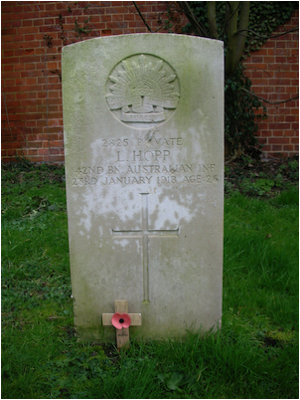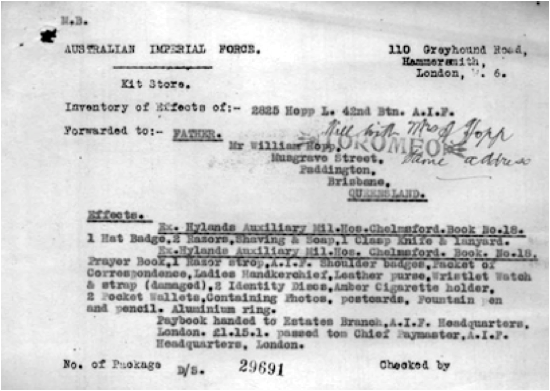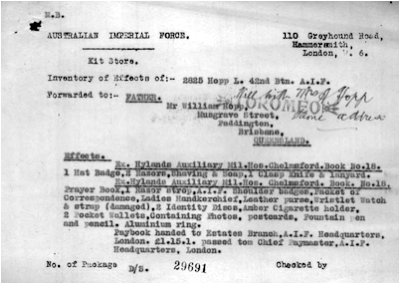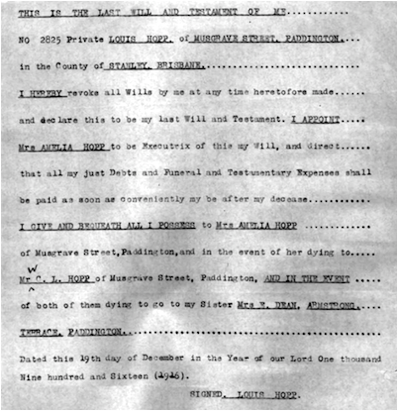Louis Carl Albert Hopp was an Australian who joined the army in October 1916. He arrived in England in March 1917 and the next month went to France. He was wounded there in October 1917 and brought back to England and sent to Hylands Auxiliary Military Hospital for medical treatment. After 99 days there he died from pneumonia in January 1918. He was buried at St. Mary’s Church in Widford.
HOPP, LOUIS CARL ALBERT*,
Private, 42nd Battalion, Australian Infantry, Australian Imperial Force
The band and firing party were supplied by the 52 Graduating Battalion, Warwickshire Regiment, and the fun carriage by 32nd Company, Army Service Corps who were stationed at Chelmsford. The 'Last Post' was sounded at the graveside by one of the bandsmen.

Louis was born in Brisbane, Queensland, Australia on 18th February 1892. His parents were William and Amelia Hopp, anglicised from Wilhelm Carl Ludwig Hopp(1856-1918) and Emilie Henrietta Wilhelmine Hopp (nee Stegemann)(1867-1932). His parents had married in Australia in 1885 and had an elder daughter Edith Anna Alma Hopp (1888-1953).
Louis attested to join the Australian Imperial Force at Brisbane on 13th October 1916. At the time Louis was a labourer and his next of kin was his father who lived at Musgrave Street, Paddington in Brisbane. He was five feet seven and a half inches tall, weighed 155 pounds, had a fresh complexion, blue eyes and brown hair.
He was given the service number 2826 and on 26th November 1916 was attached to the 6/42nd Battalion, Australian Infantry. He embarked for England from Sydney on 22nd December 1915 and disembarked at Plymouth, Devon between 3rd and 5th March 1917. he signed his last will on 19th December 1916. On 3rd April 1917 he left Folkestone for service in France.
On 4th October 1917 he was wounded in action, sustaining a gun shot wound to his
scalp. As a result week later he was arrived in England at the Middlesex Hospital in Clacton, having been brought to the country on the vessel Antwerpen.
He was subsequently taken to Hylands Auxiliary Military Hospital at Widford on 16th October 1917. After 99 days treatment he died there on 23rd January 1918 from pneumonia.
Three days later at 11 a.m. he was buried at the nearby graveyard at St. Mary's Church in Widford with full military honours.


The coffin was followed a representative the Australian Imperial Headquarters and some of the wounded from Hylands, the remainder of the patients meeting the cortege at the church. The service was conducted in the church and at the graveside by the Church of England Chaplain Rev. W. Langdon (Warwicks). Louis' attestation papers had recorded him as a Roman Catholic, but his identity disc stated he was Church of England and at his own request was attended by a Church of England chaplain.

Among those present were Sir Daniel and Lady Gooch, Mr. B. A. D. Libert. the hon. secretary of the hospital, the matron, sisters, nurses, and orderlies. There wan also a large attendance, of villagers. All the patients that were able to walk followed the coffin to the graveside. Wreaths were sent by Sir Daniel and Lady Gooch. the hospital staff, the patients, Doris and Ciss, arid Mr. and Mrs. Dorkin of Widford. The undertaker was Mr. A. A. Lucking of 79a New London Road, Chelmsford.
The auxiliary military hospital at Hylands House had established in the first few weeks of the war in August 1914 when the owner of the Hylands Estate, Sir Daniel Gooch, Bart., offered the building to the Red Cross. Initially
it was used for soldiers of the South Midland Division which was billeted in the Chelmsford area in the early months of the war. Hylands became the headquarters of the 2nd and 3rd South Midland Field Ambulance. Over 500 patients had been through the wards by October 1914 when the military transferred from Hylands to a hospital established at Oaklands Park, Chelmsford, making way for Belgian wounded. Later that month the hospital received its first British Expeditionary Force eases who had arrived in Harwich. The hospital continued to take ail the heaviest oases from the Middlesex War Hospital, Clacton-on-Sea, and the General Military Hospital, Colchester. The hospital was closed in April 1919.
140316